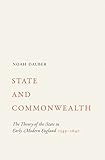State and Commonwealth : The Theory of the State in Early Modern England, 1549-1640 / Noah Dauber.
Material type: TextPublisher: Princeton, NJ : Princeton University Press, [2016]Copyright date: ©2016Description: 1 online resource (280 p.)Content type:
TextPublisher: Princeton, NJ : Princeton University Press, [2016]Copyright date: ©2016Description: 1 online resource (280 p.)Content type: - 9780691170305
- 9781400881017
- Political science -- Great Britain -- History -- 16th century
- Political science -- Great Britain -- History -- 17th century
- State, The
- POLITICAL SCIENCE / History & Theory
- Aristotelianism
- De Republica Anglorum
- Edward Seymour
- Edward VI
- England
- English constitution
- Jean Bodin
- John Case
- John Hales
- Kett's Rebellion
- Marian exiles
- Martin Bucer
- Reformation
- Sir Francis Bacon
- Sir Thomas Smith
- Sphaera Civitatis
- Thomas Hobbes
- Thomas Smith
- class politics
- commonwealth
- conscience
- distributive justice
- divine law
- emulation
- envy
- forced loan
- government
- hierarchy
- idleness
- justification
- law
- magistracy
- magistrates
- monarchical republicanism
- mutuality
- national sovereignty
- political development
- political organization
- political theory
- political thought
- postwar
- private
- public
- sanctification
- self-interest
- ship money
- social order
- social organization
- social theory
- society of orders
- society
- sovereignty
- state
- tyrants
- welfare state
- 320.1094209031 23
- JA84.G7 D29 2018
- online - DeGruyter
- Issued also in print.
| Item type | Current library | Call number | URL | Status | Notes | Barcode | |
|---|---|---|---|---|---|---|---|
 eBook
eBook
|
Biblioteca "Angelicum" Pont. Univ. S.Tommaso d'Aquino Nuvola online | online - DeGruyter (Browse shelf(Opens below)) | Online access | Not for loan (Accesso limitato) | Accesso per gli utenti autorizzati / Access for authorized users | (dgr)9781400881017 |
Frontmatter -- Contents -- Acknowledgments -- Abbreviations -- Introduction: State, Republic, and Commonwealth -- Chapter 1. The Reformers' Commonwealth -- Chapter 2. A Society of Orders -- Chapter 3. The Monarchical Republic -- Chapter 4. The Private and The Public -- Chapter 5. The Penal State and The Commonwealth of Conscience -- Conclusion: The Legacy of Commonwealth -- Bibliography -- Index
restricted access online access with authorization star
http://purl.org/coar/access_right/c_16ec
In the history of political thought, the emergence of the modern state in early modern England has usually been treated as the development of an increasingly centralizing and expansive national sovereignty. Recent work in political and social history, however, has shown that the state-at court, in the provinces, and in the parishes-depended on the authority of local magnates and the participation of what has been referred to as "the middling sort." This poses challenges to scholars seeking to describe how the state was understood by contemporaries of the period in light of the great classical and religious textual traditions of political thought.State and Commonwealth presents a new theory of state and society by expanding on the usual treatment of "commonwealth" in pre-Civil War English history. Drawing on works of theology, moral philosophy, and political theory-including Martin Bucer's De Regno Christi, Thomas Smith's De Republica Anglorum, John Case's Sphaera Civitatis, Francis Bacon's essays, and Thomas Hobbes's early works-Noah Dauber argues that the commonwealth ideal was less traditional than often thought. He shows how it incorporated new ideas about self-interest and new models of social order and stratification, and how the associated ideal of distributive justice pertained as much to the honors and offices of the state as to material wealth.Broad-ranging in scope, State and Commonwealth provides a more complete picture of the relationship between political and social theory in early modern England.
Issued also in print.
Mode of access: Internet via World Wide Web.
In English.
Description based on online resource; title from PDF title page (publisher's Web site, viewed 30. Aug 2021)


